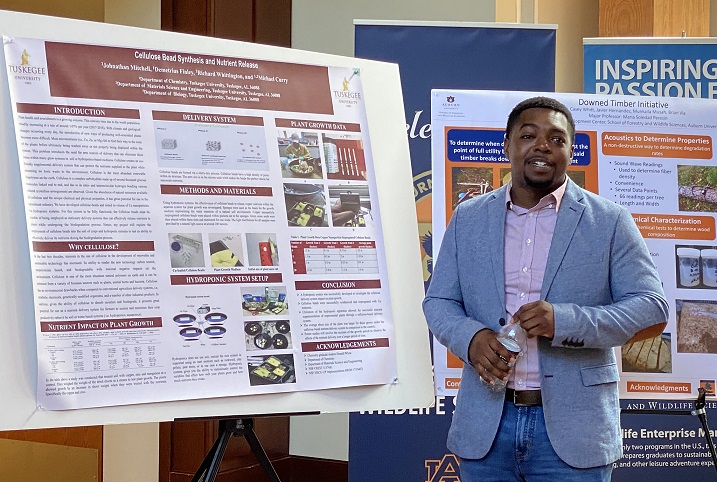Auburn University teams with Tuskegee University for STEM student research opportunities
A new collaboration between Auburn University and Tuskegee University aims to provide opportunities for Tuskegee students to explore new educational and career paths through STEM—science, technology, engineering and mathematics—research mentorships with Auburn graduate students and faculty.
Maria Soledad Peresin, associate professor of forest biomaterials in Auburn’s School of Forestry and Wildlife Sciences, established the collaboration with Michael Curry, chemistry and mechanical engineering professor at Tuskegee.
The partnership is part of Peresin’s National Science Foundation Faculty Early Career Development, or NSF CAREER, Award for which she was selected earlier this year. The award supports early-career faculty who have the potential to serve as academic role models in research and education.
Curry, who was recently awarded the 2021 HBCU—or historically black colleges and universities—Pioneering Award from the National Organization for Advancement of Black Chemists and Chemical Engineers, is excited about the prospects of this joint effort.
“This collaboration will create new opportunities for joint research projects and lab exchanges that will strengthen research outcomes for both labs. Specifically, I am especially excited that this research effort includes a significant boost for early-career STEM research opportunities for Tuskegee undergraduates.”
Peresin said the new program’s frame enables students to integrate research activities within their studies through a tier-mentorship program with graduate students.
“During these internships, students will acquire hands-on experience in the field of surface chemistry, material design and development, organic chemistry and applied engineering concepts,” she said. “This will increase their expertise and preparedness for a better transition into the job market.”
Curry and his team visited Peresin and her team July 13 at the School of Forestry and Wildlife Sciences for a daylong collaborative meeting. As part of the event, 15 students displayed posters about their research and delivered three-minute speeches to the group. The day also included networking activities and a tour of Peresin’s lab.
The collaboration was sparked earlier this year when Curry invited Peresin to speak to the American Chemical Society student chapter at Tuskegee. Through that event, chemistry major Jermya Hollins became the first Tuskegee student to join Peresin’s lab. Hollins is training in analytical techniques such as atomic force microscopy and dynamic light scattering, among other subjects. She is now beginning independent studies under the co-supervision of Curry and Peresin.
Joining Curry and Peresin’s teams at the July event were Scott Enebak, the Auburn School of Forestry and Wildlife Sciences associate dean for academic affairs; Michelle Cole, advisor of the Auburn chapter of Minorities in Agriculture, Natural Resources and Related Sciences, or MANRRS; and Ja’lia Taylor, coordinator of the Auburn Young Professionals in Training program.
“I thought the chemistry between all these people gave the meeting a great spin,” Peresin said. “It ended up not only being about our common research interest, but about the big picture.”
Tuskegee students participating in the collaboration said the opportunity had given them a new outlook on their studies and research work.
“Because of this event, my group was able to construct new research ideas and work on new collaborations, which opened doors for new students to join,” said student Morgan Fair. “I was recently on the fence of deciding if I wanted to continue my studies at the Ph.D. level and, after attending, I gained more confidence towards making a final decision.
“The advice I would give others would be to always take the opportunity to collaborate, because it opens new doors that could place you on the right path where you are destined to be.”
Another Tuskegee student, Johnathan Mitchell, said the collaboration has been especially impactful in his experience.
“Prior to this collaboration, I planned to pursue a career in the industry with my bachelor’s degree in mechanical engineering and my master’s degree in chemistry, but after seeing so much interesting research and talking to so many amazing people, I plan to continue my education at Tuskegee with a Ph.D. in material science engineering. I hope to attend the next collaboration event and those to come. I am grateful for this opportunity,” Mitchell said.
As a follow-up to these joint activities, Curry and Peresin are co-organizing symposia for the American Chemical Society at its November regional meeting in Birmingham and its national meeting in spring 2022 in San Diego.
The two also are working on a proposal for an NSF Research Experiences for Teachers site that would increase science and literacy in the state’s Black Belt region regarding the sustainable use and processing of materials.
BY TERI GREENE

Tuskegee University master’s student Johnathan Mitchell participated in a daylong collaborative event as part of a new partnership with Auburn University’s School of Forestry and Wildlife Sciences to create a STEM research mentorship program with Auburn graduate students and faculty.
Categories: Science, Technology, Engineering and Mathematics (STEM), External Engagement
Back to Articles




